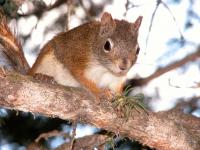
A new study shows that 'silver spoon' factors of more food and warmer temperatures can later help newborn female squirrels produce more litters themselves. As the saying goes, some people are born with silver spoons in their mouths. The same goes for at least one species of the animal world, according to research done in part by the University of Alberta.
A study of female red squirrels in Kluane, Yukon, revealed that advantageous ‘silver spoon’ factors such as food availability and spring temperature experienced between birth and weaning could reflect later on each squirrel’s lifetime fitness, longevity and reproductive success.
Until the researchers controlled for conditions experienced during adulthood, these so-called silver spoon effects were masked, said Stan Boutin, a professor of biological sciences at the University of Alberta in Edmonton, Alberta, Canada and co-author of the study. The research was conducted jointly with Michigan State University, the University of Quebec at Rimouski, and the Université Claude Bernard Lyon in France.
Using 15 years of data from a North American Red Squirrel population, the researchers discovered that female babies born into fortunate circumstances with more food, warmer spring weather and a lower population, experienced long-lasting positive effects on reproductive success, producing more offspring over the remainder of their lives.
In contrast, squirrels born into rougher circumstances with less food and bitter weather didn’t live as long and tended to wean fewer young when they were alive.
“One of the fundamental challenges for ecologists is to determine how resource levels affect the reproductive success of individual animals,” said Boutin. “Our study shows that some individuals get a real head start on their colleagues simply by being born in a good year. On the other hand, those having the bad luck of being born in a bad year may never get a taste of that silver spoon.”
Source : University of Alberta
 Print Article
Print Article Mail to a Friend
Mail to a Friend
